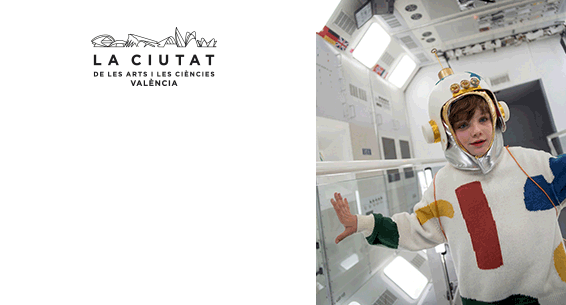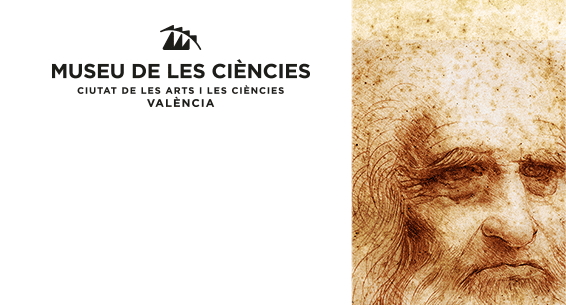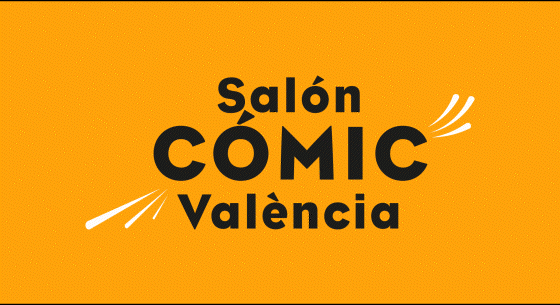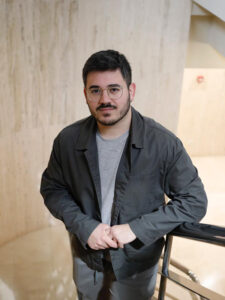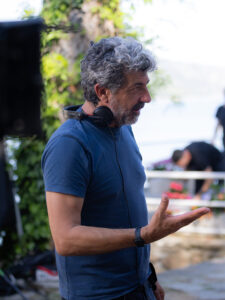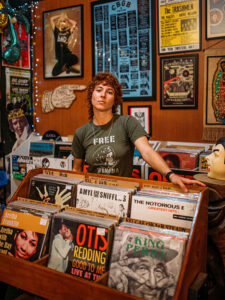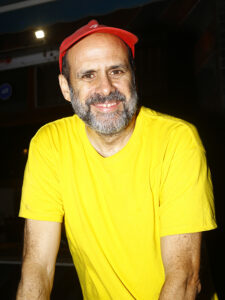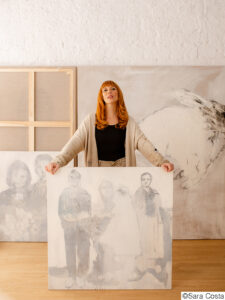Rodrigo Sorogoyen is one of the most relevant names on the Spanish film scene. Although your professional career does not begin here, it was with his third feature film, The kingdom, when would he give the bell that would consolidate him as a reference director. The keys: a solid script, well-structured characters and a forceful staging of clear classicist guidelines at the service of narrative tension.
Based on a real case, The beasts, his latest feature film, es, definitely, the culmination, till the date, of all these precepts. Starring Denis Ménochet, Marina Foïs, Luis Zahera and Diego Anido, The beasts tells the story of Antoine and Olga, a French couple who have settled in a small town in Galicia to fulfill their dream of living on a farm, far from the conditions of city life. But this paradise between mountains hides a dark side. An argument with your neighbors, the Anta brothers, will unleash an escalation of violence that they will not be able to stop. The cause: An energy company intends to install a field of windmills in the area, for which you need to buy the land owned by its inhabitants. The problem: Antoine has refused to sell his property, convinced that the company will destroy the landscape he now loves so much and, with that, his dream. Faced with Antoine's determination, the economic interests of the inhabitants of the area, among which are the two brothers, only way out of an impoverished economic situation. Background, the problems of the so-called empty Spain and an environmental activism that also faces its own contradictions. We were talking with Sorogoyen about this new production.
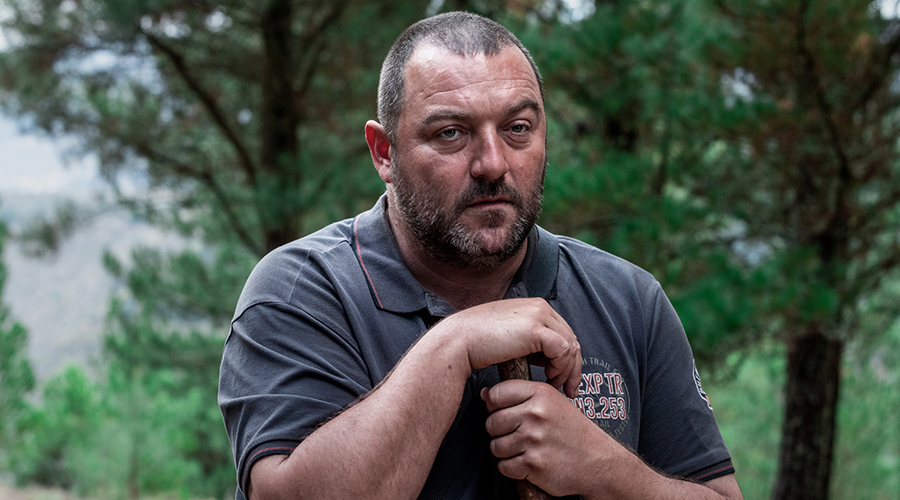
I have the impression that there is a certain desire in recent Spanish cinema to look a little towards the periphery. it is, For example, Carla Simón's film, Alcarras…
Water.
Water, exact. What do you think it is due to or what interest did you have in looking towards those other spaces??
Well, in my case, It's not to separate me, but this is a script we wrote in 2015. It is true that the trend is, you're right, but, in our case, this was going to be our third movie. Then, we decided not to. I wanted to mature more as a filmmaker, I wanted to have more control in production. We thought this was an important film.. We were in love with history, excited about the script. I saw a lot of potential in him and Isabel [Peña, co-writer], also. For all that, we strategically decided that the next film had to be of a different type. That allowed us to continue maturing it, keep working on it. On the other hand, is there a trend? Of course. I think the pandemic has a lot to do with it.. I don't think it was the same to live through the pandemic in your apartment in Madrid or in Valencia, where you can't get out, than living in the countryside without having to wear a mask. Apart, The cities are becoming very unpleasant places to live. So, is looking more at those other places. Suddenly, A book comes out like Empty Spain And you start looking there for obvious reasons.
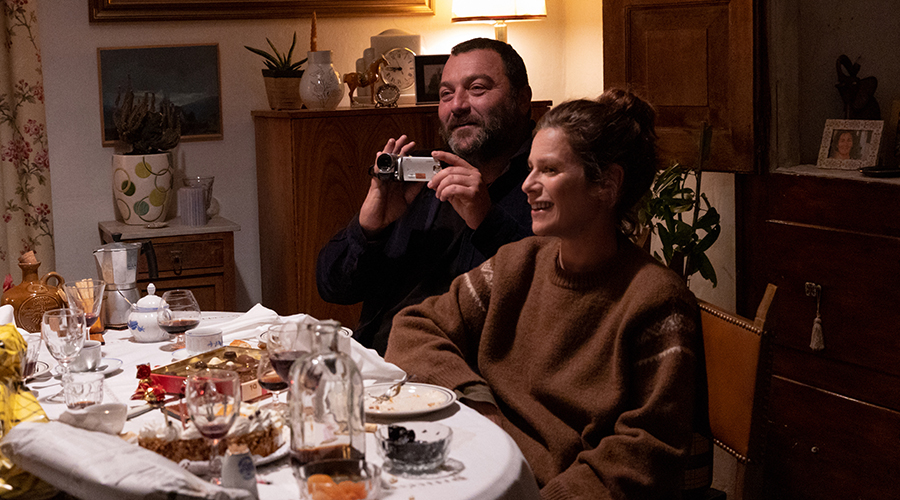
One thing that has impressed me about the film is that you breathe an intimacy that I think is very difficult to achieve when someone does not come from that geographical and sociocultural space. How did you get or what do you think are the keys to achieve that local intimacy? You don't see archetypes or clichés there, but there is a certain truth.
Well, I thank you. But I can't tell you: “mira, The key is this ". I have no idea. I think we are a very observant and empathetic team. I think I understand well the idiosyncrasies of the people or the places or the environments where we film.. Then, You have to have humility to allow yourself to be enriched by advice that may come from those people you shoot with.. Just take Luis Zahera and Diego Anido, two pro Galicians, it helps you. They have changed certain dialogues, They have suggested changes that we have added. Cinema is a team effort in which we need everyone to contribute. The director is not the one who knows the most about cinema, other way round. I believe that if we are smart it is because we know how to surround ourselves with people more expert than you.. That happens with actors too.. If I hire an actor and I want to work with him simply so that he does and says exactly what I want, It seems like a very one-way job to me and, therefore, very uninteresting and enriching, very little positive, eventually.
The film poses a confrontation between the subject who arrives from outside and those who inhabit the place. Again, the eternal dichotomy between mine and yours. You're not from here. Are we still like this?
Bueno, what do you think? (laughter)
I think so (laughter)
I think that too. Of course, fuck. This is a country with a lot of nationalism.. There is a lot of nationalism, how to say it, non-centralist, peripheral, but then there is a great centralist nationalism. I mean, what, practically, we are all nationalists (laughter). So, Yeah, there is something from the homeland, of that invention that was invented, but that it has been misunderstood and that in recent years it has become very politicized, unfortunately. That's no coincidence. We are a country to which this reaches us more than others.. Then, there is also xenophobia itself, which seems to me to be very human, unfortunately, and that you have to educate her. Just because it is very human does not mean that we justify it., The thing is that I think I understand where it comes from.. I think it's lack of education. I think it takes sensitivity and generosity to try not to let it dominate us., of course, but there is something very tribal in that “this is mine”, or “who comes from outside”. Sergio Molino explains it like a motherfucker in Empty Spain. It is a fundamental book. It fascinated me because it explains the hate/fear relationship very well., because deep down it is fear. I'm afraid of you because I don't know you. Fear comes from lack of culture, comes from a lack of knowledge, It doesn't come from fairy tales. The rural area had hatred/fear of the city, but equally the city had hatred/fear of the rural. There was something that collided head-on and that still exists.
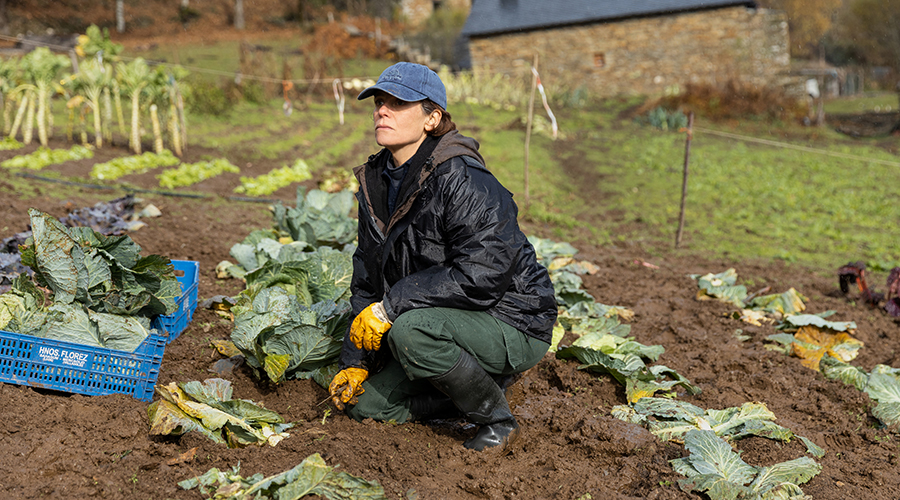
The film presents the point of view of someone from outside, from a foreigner. He could have been a man from Madrid who goes to a rural village, but you have decided that your protagonist was from another country. What did that detail contribute to the story??
A lot. The powerful thing about the real event is that a couple of foreigners choose a village in Galicia to live.. It's very nice, you can understand it, but what you can't understand or it's hard for me to understand (and that's why we made the movie, to try to understand it), the thing is, despite the threats, have chosen this. These people stayed there. And not only did the two of them stay there, but she stayed. That seems incomprehensible to me and, at once, fascinating, that's why we make the movie. The fact that they are foreigners contributes a lot, besides, to the feeling of loneliness of both. Xenophobia and hatred is always stronger the further away you are from your home. If a Japanese comes to a village, It's going to feel much further away.. And the native from there will feel much more foreign and, therefore, with fewer rights. It is not the same for someone to come from León to Galicia as for a Catalan to come., or for a Moroccan to come, or for a South African to come... The further away and the more different the culture, more feeling of foreignness. Yo, When I have felt most alone is in a foreign country.. If I lose myself, I'd rather get lost in Madrid or Toledo than get lost in Japan, ¿no?
in your cinema, and in this movie it is, highlights the issue of violence. I am referring to violence that is verbal., It is a gestural violence, that of small everyday gestures. It gives the impression that there is an interest in your work to show that violence, that other side of everyday life that, suddenly, exhale something else.
Yeah, Yeah. It's obvious that I'm interested. I don't know why I'm interested, but I'm interested. Violence is something that interests me a lot because, every time I see something violent, on the street or I read it in the news, I put my hands on my head. It worries me, it worries me. I don't know why a man who loves a woman ends up killing her.. I don't know why a father can kill his children to ruin the life of his partner or ex-partner.. I don't understand how we continue, after 12.000 years of civilization, sending bombs to places, to civilian population. That has been the entire history of humanity and it continues to repeat itself. It's something that can't be denied, is within us. We feel violent impulses, but it's such an impulse, tan, so animal, so visceral and that creates so much damage and so many tragedies and so many dramas, which interests me a lot. Then, We are also very conciliatory beings and capable of the best. Both in the case of individuals, moments or circumstances, we have been architects of great conciliations. I do not know, that dichotomy fascinates me.
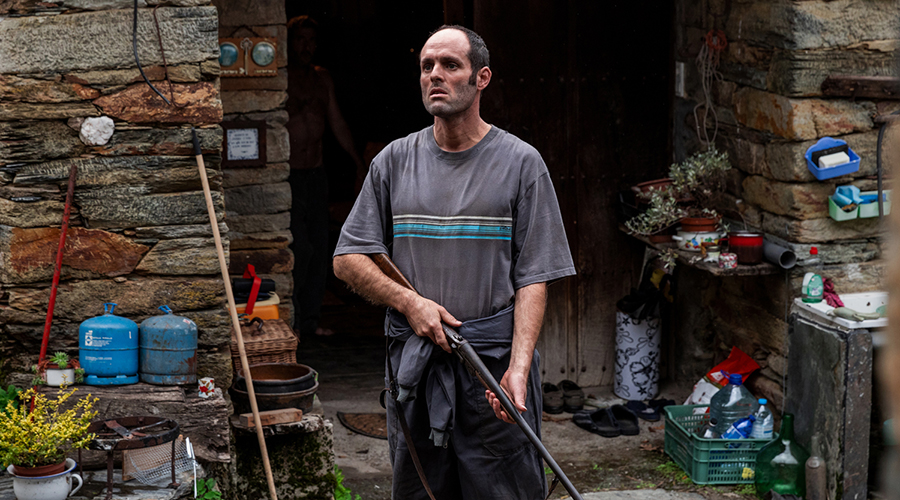
I was referring especially to that which comes out of the everyday gesture.
Yeah, It depends on each movie. May God forgive us I was going more for the rapist of old women and murderer, Here it was another violence of bullying, of harassment, I don't like you, I make you a joke and make you feel uncomfortable. The film was based on that terrible coexistence in which some guys want to make someone's life impossible so that they leave.. Yeah, I'm also interested because it is another type of violence., just as harmful, just as ugly, just as unpleasant, but it seems less so because you are not using your hands.
Somehow, the film questions this somewhat bucolic image of the countryside that has recently been idealized. I don't know if that was your intention.
Bueno, it's an intention, but that's not the intention of the movie. It's one thing to make a movie on this site. Now, how do we portray this site? Movies are a reflection of what the filmmakers who make them think.. The mountain, It's not that it's not an idyllic place., I love it. Spend a day or two, one my, in the countryside, it is wonderful. Just like the city, that has terrible and horrible things, but it also has its comforts. The mountain is a wild place, sometimes uncomfortable, many times beautiful and very monumental, but we cannot deny that it also has meteorology, tiredness... We don't want to idealize anything. You one The kingdom we have idealized politics, you one May God forgive us we have idealized the police. It's not that I don't want to tell this about the countryside.. I also had no interest in doing so.. Simply, I portray him as I think he is.
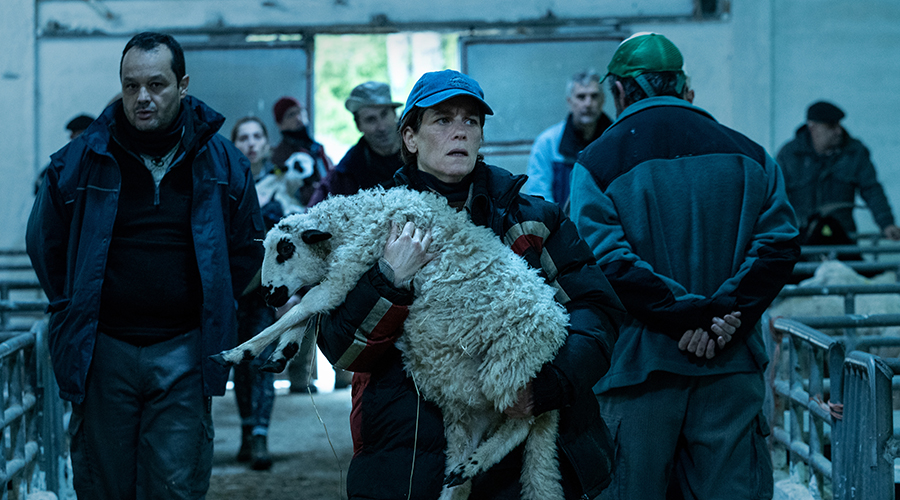
In that portrait, The movie poses an interesting dichotomy., and it is that, against the activism of those who come from outside and look at that local space and believe they understand it, the brothers are also partly right. To what extent were you interested in expressing that dichotomy between those two spaces??
I think that when you make a movie of bad guys and good guys it stops being interesting. That bores me. These are the movies that don't interest me when I'm a viewer.. I am interested in human beings and, therefore, I am interested in my characters. When we created two dangerous guys, uncomfortable, what interests me is, first, understand them. And how, by understanding them, They seem interesting to me, I like the viewer to think and feel the same. Isabel and I try to create complicated conflicts, we like moral questioning, the debate in life. Every time they tell you about a conflict, rarely, unless you are very Taliban, you can say: “here you are right, in this person". No, that person has his reasons and this other person has those others, and that is the way to try to reconcile and be less and less violent. I think that violence also arises from that “I don't understand why you are attacking me.”, And if I think you are attacking me, it is because I do not understand your reasons.”. There is a conflict here. Then, things happen that are not justifiable, evidently, but there is a conflict that interested us and that was that there was no point of return, that the other party could not be convinced. And why can't you convince the other party? Because they both have their reasons. That suited the script very well because that leads to a dead end so that it ends as it should end.. The movie, I say (laughter).
What you say catches my attention a lot because, generally, Spanish cinema works, in many aspects, with a very flat character construction, especially when there are certain debates or social conflicts. That's why it surprises me when someone is interested in looking for the folds or the other sides of a situation..
Yeah, I agree with you (laughter)
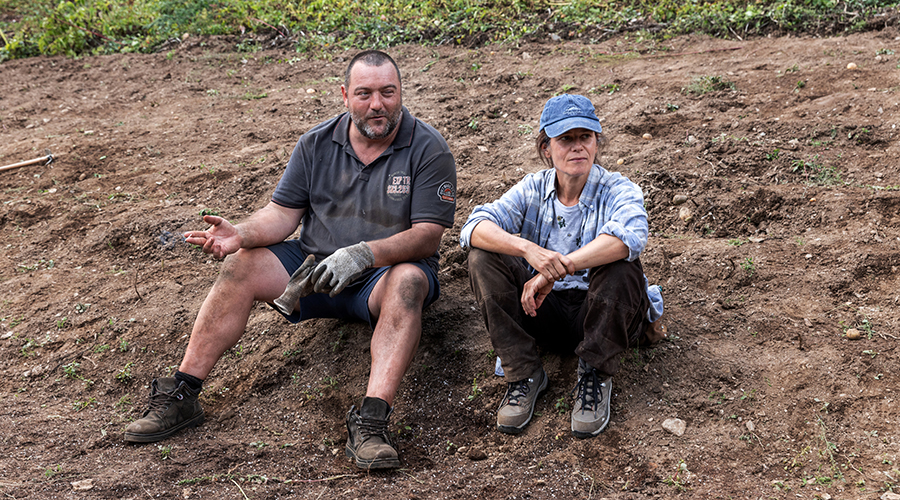
Today I read a news story about a man from Badajoz who had his property burned down for something similar to what happens to your character., in this case with respect to a photovoltaic plant. It seems that here the confrontation was with the local administration. In your movie, that confrontation with political power is left out of the story.. Did you never consider her?
No. I wasn't interested, it didn't fit in the movie. When you work on a script, The most difficult thing is to select what goes into the film. I think I'm less interested, and Isabel too, and I think the viewer is less interested. And if we were not interested it was because our protagonists, whether the French or the two brothers, They are not within those political decisions. We are very radical with the point of view of our scripts. We like that because I think it makes the viewer empathize more with the film.. I think that being radical with the point of view suits the film very well and, as we always are, that didn't fit. In this case, we liked to see how individuals are the final victims of those political decisions.
Another element is the male/female dichotomy.. We always end up in that duality man equals violence, women, nonviolence. I wanted to ask you if you weren't a little afraid of falling into a certain cliché..
No, It's true that I didn't have it., and I'm thinking why. Do you know what's up? Which I think is true. I mean, I don't think there are women more violent than any man., but I think that, in general, the man is a thousand times more violent. Evidently, there are peaceful men, of course, and violent women. But if you have to choose who is the violent one, obviously it's the man. I guess what I said is not very popular., but I agree. So, How do I agree?, I didn't care about that cliché.. I mean, I really believe everything that happens in the movie. I believe that those three men do what they do.. And I think those three women do what they do. So, How do I believe it?, I'm going with it.
A relationship that I find super interesting is the relationship that Olga has with her daughter.. There is a dichotomy that goes against the current.: the idea of the daughter who reproaches her mother for being submissive because she follows the father in his personal ventures. The movie, somehow, break with that. Was there a specific interest?
Yeah, Of course. Actually, the center of the film is the character of Olga. Many times you see in the cinema, and in life, to those women who seem to go after that alpha male type man, more charismatic, more powerful or determined. But later, if you dig a little, you see that the woman pricks and cuts, especially if it's a couple like this, balanced in the sense that they love and care for each other. There is no dominator here, but we see it from unfair eyes, as those of any child can be. We liked this a lot because it added drama, brought conflict. Besides, for us it was the voice of the viewer. The viewer surely thinks: What is this woman doing there?? The daughter comes to say the same. That seemed very interesting to us.. What I tell you again, I believe it. I believe that daughter does and says that. we liked.
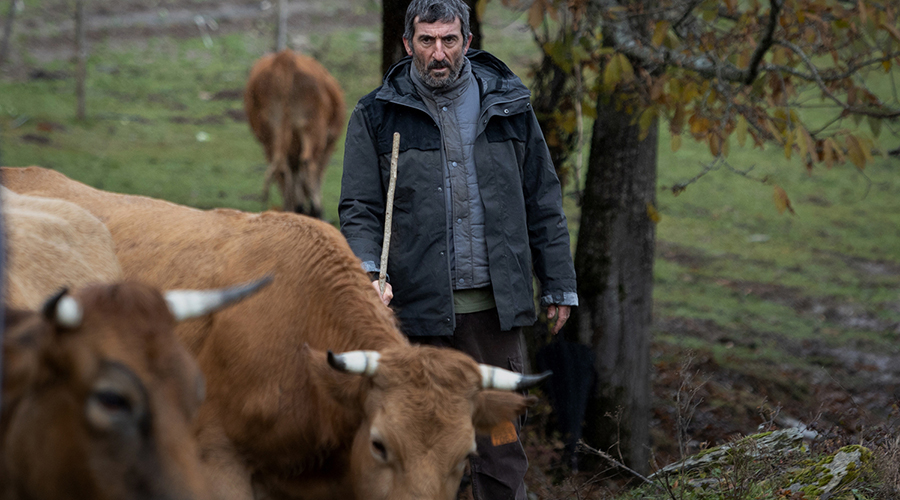
It is evident that your films have a well-worked script., but in this film it seems to me that there are elements that are purely audiovisual and that also tell the story a lot. I'm thinking, For example, in that powerful image of the windmill blades, when Antoine finally goes to see them, and that function as a metaphorical element, but it also advances the story. How did you mix these elements? To what extent is the script ironclad and do you not go outside of it??
Well look, you have just touched the key scene (laughter). Our scripts are ironclad in the sense that they are so, tan, so worked, that it is difficult for them to stagger. Difficult does not mean impossible. The good thing about being two is that the toughest part is carried by Isabel, as a screenwriter he is. And I carry the freest part, as a filmmaker that I am, because then I'm the one who goes to the set and find things I like. I try to open more, but having built a lot. I like to go with a very constructed script., that's true, but that does not mean that there will be other things later. But that scene wasn't in the script.. I don't know if you have been under one of these mills. They are incredible monsters. It's hypnotic, at the same time it's scary. It seems like they are going to kill you. I called Isabel and told her: oye, this has to be put in no matter what. These are such beautiful things about making movies., that is alive.
Another element of the construction of the film is related to the internal rhythm of the scenes and the construction of the narrative.. It seems to me that it has been impeccable.
What has been impeccable? Gracias. Bueno, for a start, the script is already rhythm. while I write, I'm getting caught up in that rhythm. Then, You also shoot the scenes in a certain way and there you are already choosing or limiting a rhythm. If you shoot a scene in one shot, you already know the rhythm of that plane. If you roll it in many planes, you know what you can play with. And then, is the assembly, the last and the great creator of rhythm. This movie had to have a slow pace. It was a kind of risky bet because people increasingly want things faster.. Throughout, in life and in cinema. When I watch a movie with a slow pace, but with good rhythm, I love it because it seems more complicated to me. But I already told you that I try to get him to send me the story. It's not that I want to make a slow-paced movie., I think that's what history suits. It is a film that I have decided to direct in a very classic way, with wide plans, long in time, with a lot of fixed shots or with slight panoramic shots. That slows down the pace.. Then there is the fact that things happen within that plane because, if things don't happen, no matter how much you do a lot of editing and want to give it a fast pace, it's going to be boring. It is a compendium of everything. There is no norm, there is no secret, I don't even have the perfect solution. I am guided a lot by intuition. I guess I'm guided by the movies I see and what I want to see..


